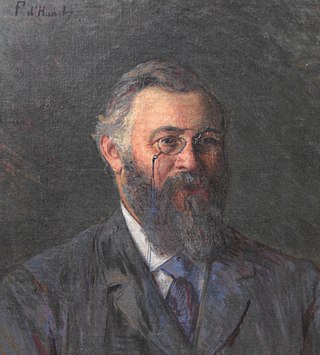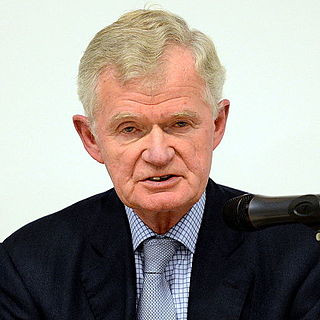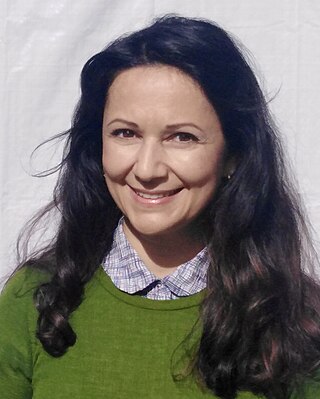Overview
Tageblatt was established in 1913. [2] [3] The paper is the country's second-most popular newspaper, [1] behind the rival Luxemburger Wort . Tageblatt describes itself as the Zeitung fir Lëtzebuerg (Luxembourgish for the newspaper for Luxembourg). Although it is mainly published in German, it has also sections published in French language. [2]
The daily is owned by socialist trade unions. [3] [1] The publisher is Editpress Luxembourg SA, [4] which also publishes Le Jeudi and Le Quotidien . [5] As of 2007 the daily had close relations with the Socialist Party (LSAP). [1]
The newspaper received €1,659,554 in annual state press subsidy in 2009: more than any other newspaper. [6]
The circulation of Tageblatt was 27,081 copies in 2003. [4] In 2004, the paper had a daily circulation of 17,106: about one-quarter that of Luxemburger Wort. In the mid-2000s its readership was 61,100, or just over one-third that of its rival. [7]
History
Historically, the Escher Tageblatt considered itself an instrument in the political battle for the Left Bloc which dominated Luxembourgish politics from 1908 to 1916. [8] : 9 This bloc was composed of democrats and young liberals, who were less conservative than the liberals who had dominated political life in the Grand Duchy for the 19th century. [8] : 9 The democrats also called themselves social democrats snce the foundation of the social-democratic party in 1903 around Michel Welter (1856- 1924). [8] : 9 The majority that the Bloc had in the Chamber of Deputies since 1908 consisted of Deputies from the cantons of Esch, Luxembourg-Ville and Luxembourg-Campagne, in other words, the main industrialised cantons comprising the most important localities in the country. [8] : 9
Elections to the Chamber took place using a majoritarian system with two rounds up until 1919. The constituencies were the cantons. The candidates stood for election individually, but in the most populous cantons, alliances could come about as early as the first round, but almost always in the second round. [8] : 9
The canton of Esch had the highest population and was allocated 15 Deputies (out of 51) in 1914. [8] : 9 The group that would win the canton of Esch was certain to have a political force in the Chamber. It was to this end that the Escher Tageblatt was founded in 1913. [8] : 9
However, the Left Bloc lost its majority to the Party of the Right in 1917. [8] : 9 In 1919, a new proportional representation system with party lists was introduced, with four constituencies (South, Centre, North, East). [8] : 9 The South constituency formed from the cantons of Esch and Capellen is still to this day the constituency with the highest population, and has the highest number of deputies. [8] : 9 The Escher Tageblatt could therefore continue to function with its "regional" title, while still making efforts to win over readers from the centre through agencies in the capital, first in the Rue Chimay, then in 6 Rue de la Reine. [8] : 9
On 2 May 1947 it renamed itself the Tageblatt, while retaining the French sub-title of "journal d’Esch", which it carried since 1918. [8] : 9 This sub-title disappeared on 2 January 1973, as regional differences faded. [8] : 9 Soon, the south was no longer exclusively industrial (after the steel crisis of the 1970s), nor were the north and east exclusively focused on farming or wine-growing. [8] : 9 Helped by mobility, living conditions were increasingly similar from one constituency to another. [8] : 9
The founder of the newspaper was Paul Schroell (1879-1939), who came from a family of printers, book-sellers and editors from Echternach and Diekirch. [8] : 9 His cousin Emile Schroell (1863-1934) was the owner of the Luxemburger Zeitung , a moderate liberal newspaper (1868-1941) created by Théophile Schroell (1829-1893) in the capital. [8] : 9 In 1911 he had rejected the offer by Paul Schroell (also the editor of the Landwirt, published in Diekirch) to merge their printing companies. [8] : 9 In creating the Escher Tageblatt, Paul Schroell then founded a competing company in the canton of Esch, home to the steel industry and the economic centre of the country. [8] : 9 Clearly more combative than the venerable daily newspaper of Emile Schroell, the Escher Tageblatt had from the start a more polemical and feisty tone in political debates. [8] : 9
The history of the Tageblatt consists of two stages, which are distinct in some ways, but show some continuity, embodied by the founder's plan to bring together the various components of the political and intellectual left wing of the country. The first stage was from 1913 to 1927, the second from 1927 to the present day. It was in 1927 that the independent trade unions and the Worker's Party bought the newspaper and printing works belonging to Paul Schroell for 1 million Luxembourgish francs, while renting the office spaces in Esch and with the obligation, imposed by the seller, to keep on the hitherto employed staff.
In 1913 the Escher Tageblatt had a circulation of around 2,000. It was, then, a newspaper with a lower circulation than the two largest newspapers, the Luxemburger Wort (circulation 8,000) and the Luxemburger Zeitung (6,000).
Luxembourg is a parliamentary representative democratic monarchy, whereby the prime minister is the head of government, and the multi-party system. Executive power is under the constitution of 1868, as amended, exercised by the government, by the grand duke and the Council of Government (cabinet), which consists of a prime minister and several other ministers. Usually, the prime minister is the leader of the political party or coalition of parties having the most seats in parliament. Legislative power is vested in both the government and parliament. The judiciary is independent of the executive and the legislature.

Paul Eyschen was a Luxembourgish politician, statesman, lawyer, and diplomat. He was the eighth prime minister of Luxembourg, serving for twenty-seven years, from 22 September 1888 until his death, on 11 October 1915.

Constituencies are used to elect representatives ('deputies') to Luxembourg's unicameral national legislature, the Chamber of Deputies.
The Party of the Right, abbreviated to PD, was a political party in Luxembourg between 1914 and 1944. It was the direct predecessor of the Christian Social People's Party (CSV), which has ruled Luxembourg for all but fifteen years since.

Dr. Michel Welter was a Luxembourgian politician, and former leader of the Socialist Party. A member of Luxembourg's Chamber of Deputies, he served as the Director-General for Agriculture, Commerce, and Industry from 24 February 1916 until 3 January 1917, during the German occupation.

Luxemburger Wort is a German-language Luxembourgish daily newspaper. There is an English edition named the Luxembourg Times. It is owned by Mediahuis Luxembourg.

Ben Fayot is a Luxembourgish politician from the Luxembourg Socialist Workers' Party (LSAP). Fayot sat in the Chamber of Deputies for five years from 1984. He was a Member of the European Parliament from 1989 until 1999, when he returned to the Chamber of Deputies. Since 2004, he has been the president of the LSAP's deputation in the Chamber of Deputies.
The Lëtzebuerger Journal is an online magazine in Luxembourg. It was formerly a daily newspaper published six times a week until 1 January 2021. The online magazine is currently managed by Daniel Nepgen, Lynn Warken and Melody Hansen (editor-in-chief).
d'Lëtzebuerger Land is a weekly newspaper published in Luxembourg. It is in German, French and Luxembourgish.
The Obermosel-Zeitung was a German-language newspaper published in Luxembourg between 1881 and 1948. In 1948, it merged into the Lëtzebuerger Journal.
Editpress is a publishing company in Luxembourg. It publishes several newspapers, including its flagship daily Tageblatt, and 50% shares in the free daily L'essentiel and the French-language daily Le Quotidien.
Paolo Amodio is a Luxembourgish football manager and former professional player. He played as a striker.
The Maulkuerfgesetz was a proposed 1937 law in Luxembourg. Officially, it was entitled the "Law for the Defence of the Political and Social Order" but was nicknamed Maulkuerfgesetz by its opponents. The law would have allowed the Luxembourgish government to ban the Communist Party and dissolve any political organisation which they believed might endanger the constitutional institutions. The members of these parties or organisations would be stripped of their political offices and could not be employed by the state or by local governments.
Le Quotidien is a French-language daily newspaper published in Esch-sur-Alzette, Luxembourg. It has been in circulation since 2001.
Emile Haag is a Luxembourgish historian, trade unionist and former principal of the Athénée de Luxembourg. Since 1987 he has been the national president of the confederation of government employees, a Luxembourgish trade union. In 1997, he was made commander of the Ordre de la couronne de chêne. Between 2005 and 2015 he was also President of the chamber for government employees. On 29. Juni 2015 he was made honorary president of that chamber.
Diane Adehm is a Luxembourgish politician of the Christian Social People's Party (CSV). She has been a deputy since 2011.

Semiray Ahmedova is a Luxembourgian architect and politician of The Greens. She became a deputy in 2019.
Nouvelle Équipe is the name of a group of Luxembourg artists after World War II who focused on innovation in art.
The Luxemburger Zeitung was a liberal, German-language daily newspaper, which appeared from 9 March 1868 to 29 September 1941 in Luxembourg. It appeared six days a week and was the successor to the French-language Courrier du Grand-Duché de Luxembourg, which had ceased publication three days before the Luxemburger Zeitung first appeared.
Partial general elections were held in Luxembourg on 14 June 1881, electing members of the Chamber of Deputies. The elections took place in Luxembourg-Ville, Capellen, Clervaux, Diekirch, Redange, Grevenmacher, Vianden, and Esch-sur-Alzette.







